Ever noticed? The most successful eCommerce websites are multi-vendor in nature. For instance — Amazon, eBay, Walmart, Airbnb, etc they all are the key players of the eCommerce industry. Not to mention, most of these popular brands started as a single-vendor store but they expanded their business globally as multi-vendor marketplaces.
Here are a few reasons why the multi-vendor marketplaces are growing in demand:
- More traffic
- High count of URLs
- Wide range of products
- Extra sales
- Better revenue
- Better scope of expansion
In the case of a multi-vendor eCommerce marketplace, there are more stakeholders involved as compared to the single vendor online stores. Let’s talk about the primary stakeholders,
Admin: The admin of the marketplace is responsible for partnering with the vendor and listing their products on the website. The admin can charge a percentage (i.e. commission) from the vendors on the selling price of an item. The other revenue sources could include banner ads, delivery charges, subscription fee, etc.
Vendor: The products and services are collected from a wide range of suppliers/vendors who are in collaboration with the marketplace owner.
Buyers: Buyers enjoy a varied range of products in a multi-vendor marketplace than at a single vendor online store. These multi-vendor marketplaces act as one-stop shopping destinations for them.
Let’s take a look at some interesting stats and facts about the multi-vendor marketplaces:
- $1.97 Trillion was spent globally on the top 100 online marketplaces in the year 2019.
- The top 2 global leaders based on the merchandise value are from China.
- More than half of the total multi-vendor marketplaces were launched in the last 7–8 years.
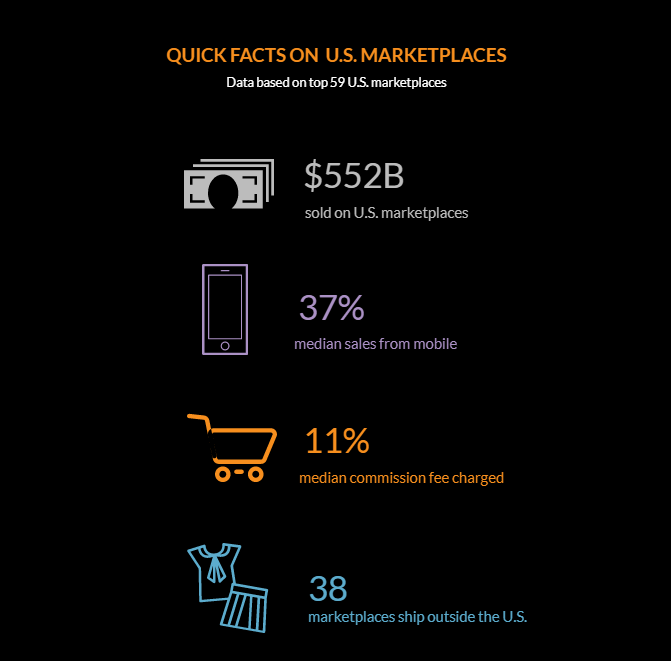
Woah! 2020 is for sure a great year to start a niche-specific eCommerce marketplace. Take a look at this eCommerce marketplace guide if you are really keen to learn about the different niches in multi-vendor eCommerce.
Moving forward, we will be exploring the top software solutions that are developed exclusively for building multi-vendor eCommerce marketplaces.
Top 5 Multi-vendor Marketplace Solutions
There are hundreds of software solutions available in the market for building eCommerce websites and mobile apps. But not all of them are capable of developing a multi-vendor eCommerce platform.
Some eCommerce solutions like BigCommerce, WordPress, Magento, etc., use plugins to convert the online store into multi-vendor marketplaces. Plugins and extensions such as Product Vendors, WC Marketplace, Dokan, and WC Vendors allow you to set up and manage all the elements required for a fully operational marketplace.
No doubt, these multi-vendor ecommerce solutions seem cost-effective in the beginning, but as your marketplace grows, you may need to upgrade your plugins and infrastructure requirements. Apart from the additional cost, there are other issues that you might encounter. For instance, integration challenges, performance issues, security vulnerabilities, etc.
But there are some standalone solutions as well. These solutions are capable of developing multi-vendor marketplaces without any external or extra support.
Here are such top 5 standalone multivendor eCommerce platforms:
- Yo!Kart
- CS-Cart
- Shuup
- Sharetribe
- X-Cart
1. YO!KART
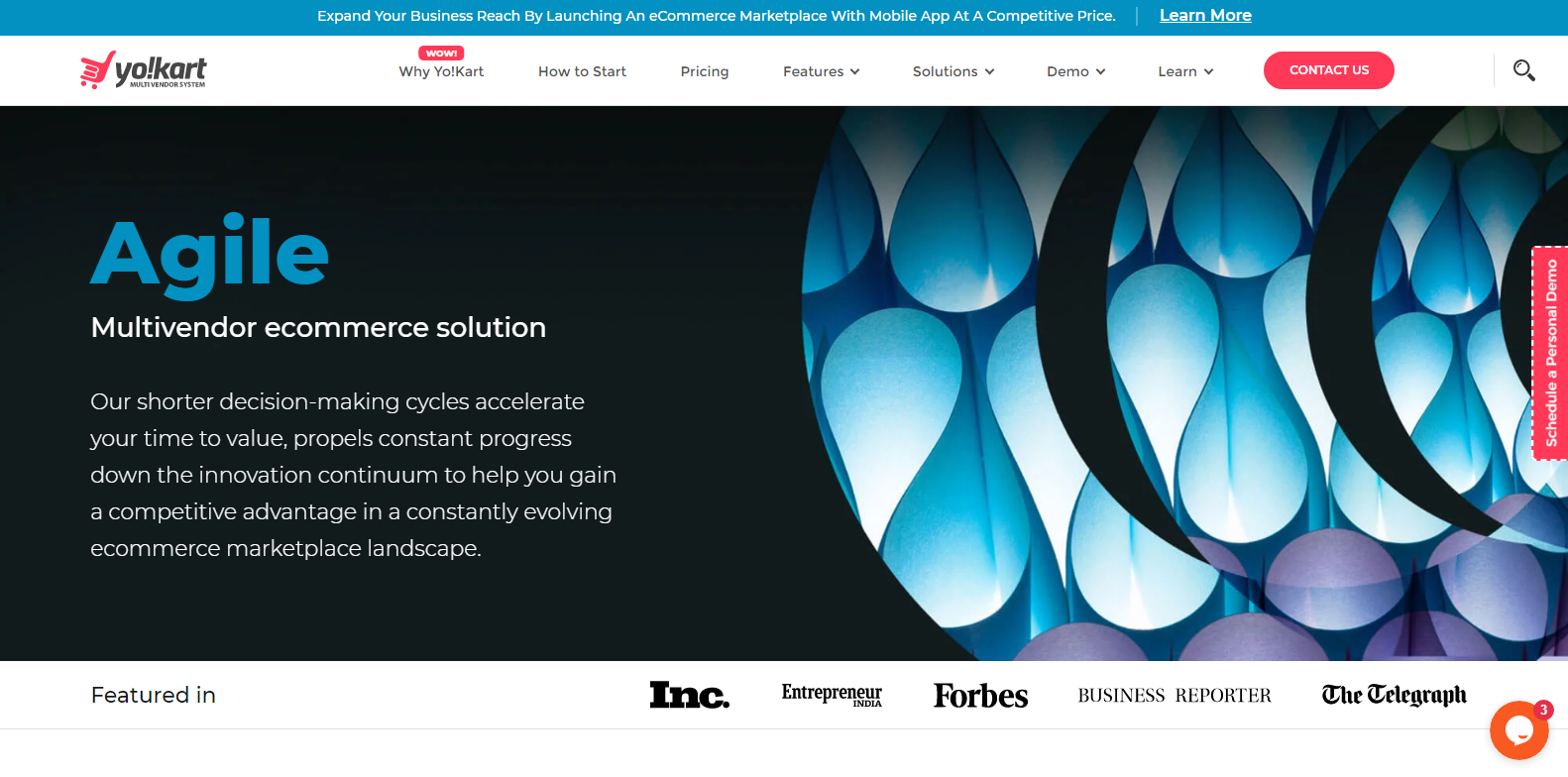
Yo!Kart is a complete eCommerce solution to launch online marketplaces. Launched in the year 2015, it has provided world-class support to 2000+ clients including few billion-dollar businesses.
A self-hosted solution with unrivalled enterprise functionality and system performance, Yo!Kart multi-vendor has been serving all i.e startups, SMBs and enterprise-level businesses. The solution has market-ready mobile apps for buyers and sellers to provide an omnichannel digital experience.
Yo!Kart has recently launched its latest version Yo!Kart V9.3.0 with features and enhancements to Personalize Shopping Experiences & Automate Payouts, Taxes & Shipping. Yo!Kart’s parent company FATbit Technologies can also help you with custom eCommerce development services at an affordable cost.
Below are a few features & functionalities that make Yo!Kart an optimum eCommerce Multi-vendor Marketplace Solution:
- Product Catalog System
- Separate Vendor Store-fronts
- Abandoned cart recovery
- Tax management APIs such as QuickBooks, TaxJar, Avalara
- Shipstation API
- Advanced order management
- 20 Pre-Integrated Payment Gateways
- Multilingual & Multi-currency
- 100% Custom and scalable solution
- Ready Mobile Apps
What is Missing in Yo!Kart:
- Free themes are not available
- Product upgrades are paid
Yo!Kart Pricing
What makes Yo!Kart stand apart from the competition is that it is a self-hosted solution. The payment is one-time, so there are no recurring monthly/yearly fees and zero transaction charges. You get a fully owned license and you can make the payment as per your convenience because of the flexible payment terms.
Take a look at the packages:
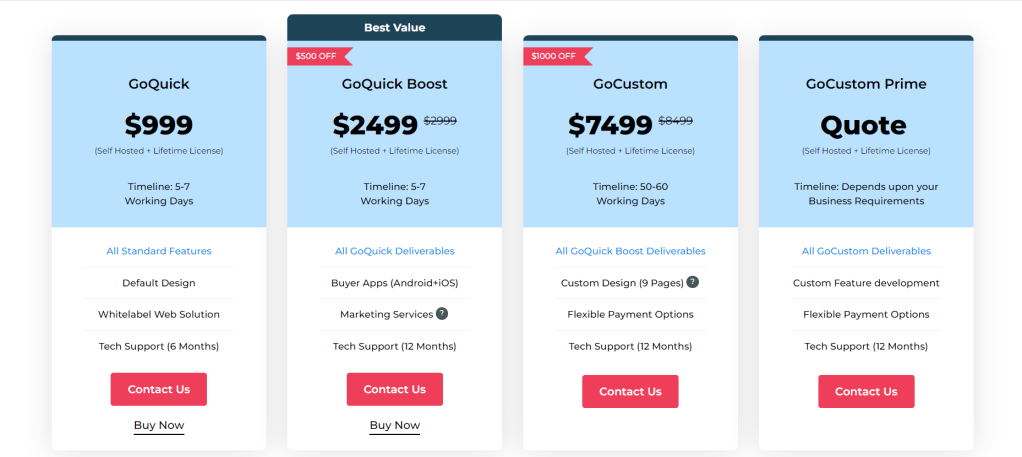
Not just this, Yo!Kart also has a startup package of just $500 to support aspiring entrepreneurs.
2. CS-Cart

Launched in the year 2005, CS-Cart has powered thousands of eCommerce marketplaces in around 172 countries.
CS-Cart provides most of the powerful yet easy to use tools to create a fully-functional online store of any size. In addition to the extraordinary features, it also comes with a built-in theme and layout editors allowing to make sophisticated storefronts.
The key features of CS-Cart are:
- Unlimited integration capabilities
- Open source code
- Powerful catalog management system
- Advanced vendor payout system
- Multiple levels of administrative access
- Advanced order management system
- Real-time and manual shipping calculations
Limitations of CS-Cart:
- Add-ons like Google Tag Manager, Order Cancellation, Wallet System, etc., are paid
- Limited and credit-based technical support
CS-Cart Pricing:
The basic package of CS-Cart starts from $1450 (one-time payment) that is approximately 50% more than the Yo!Kart package. But is pricing the only differentiator among Yo!Kart and CS-Cart?
Let’s discover more — why most entrepreneurs prefer Yo!Kart over CS-Cart: Yo!Kart vs CS-Cart
3. SHUUP
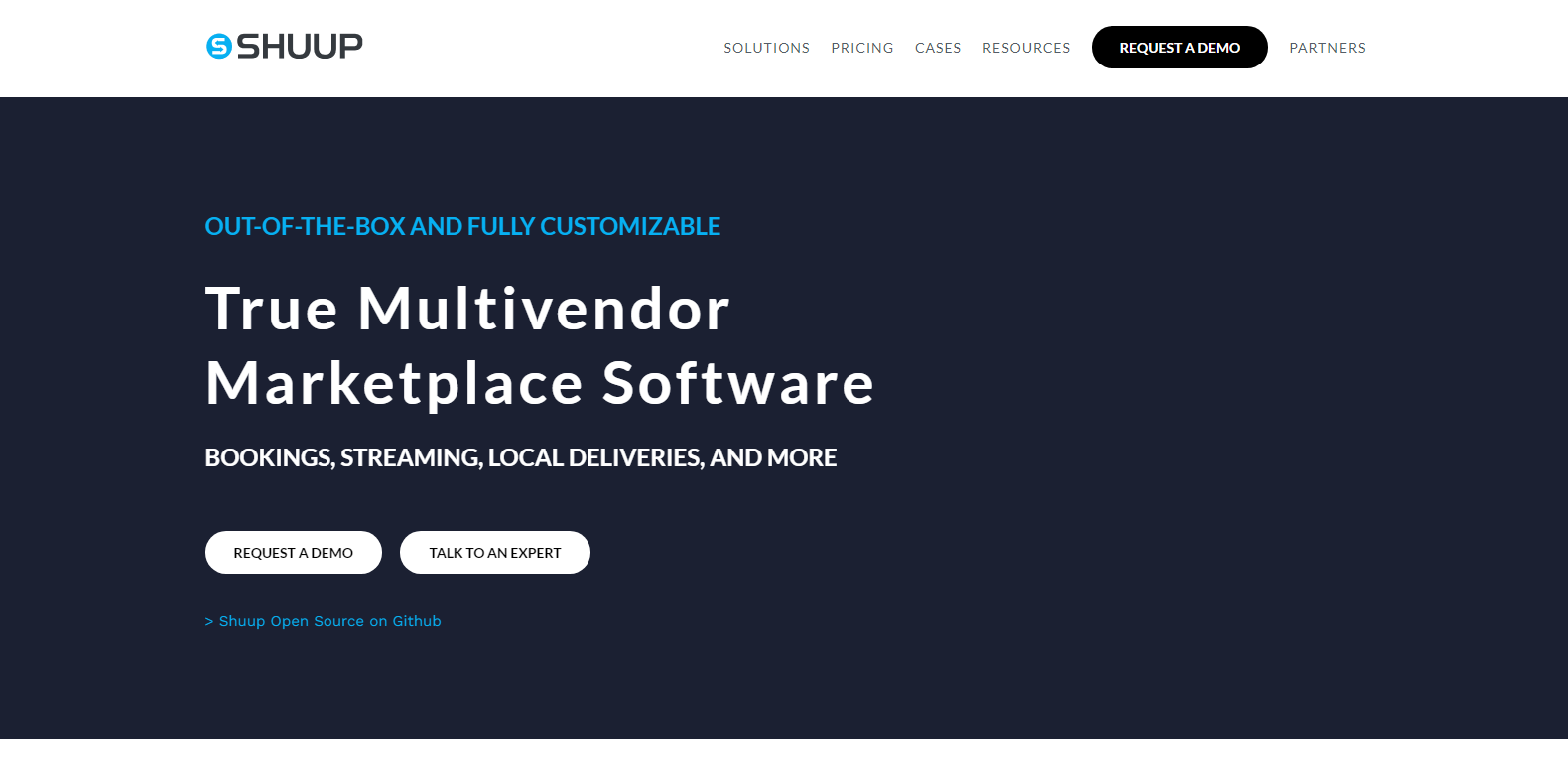
Founded in 2014, Shuup is an open-source eCommerce solution that is easy to use, customize and scale. It is developed for building niche-specific B2B websites as well as huge mall-like marketplaces similar to Amazon.
Some of the integrations provided by Shuup are Quickbooks, Stripe, MailChimp, Google Analytics, etc.
Let’s take a look at the major features offered by Shuup:
- Custom Marketplace Branding
- Bulk Product Editing
- Easy, Single Page Checkout
- Delivery Driver Management
- Automate Sales and Email Marketing
- CMS With Blog and Video Content
- Delayed Vendor Payouts
- Import/Export Products, Customers, and Data
Where does Shuup lack:
- Open source solutions attract more hidden charges and security risks
- No Free Trial Available
- Expensive solution
Shuup Basic Package:
The basic package of Shuup License for Business Package is at $7500 (one-time payment). If compared to other competitors, the pricing of Shuup seems to be on the higher end.
4. Sharetribe
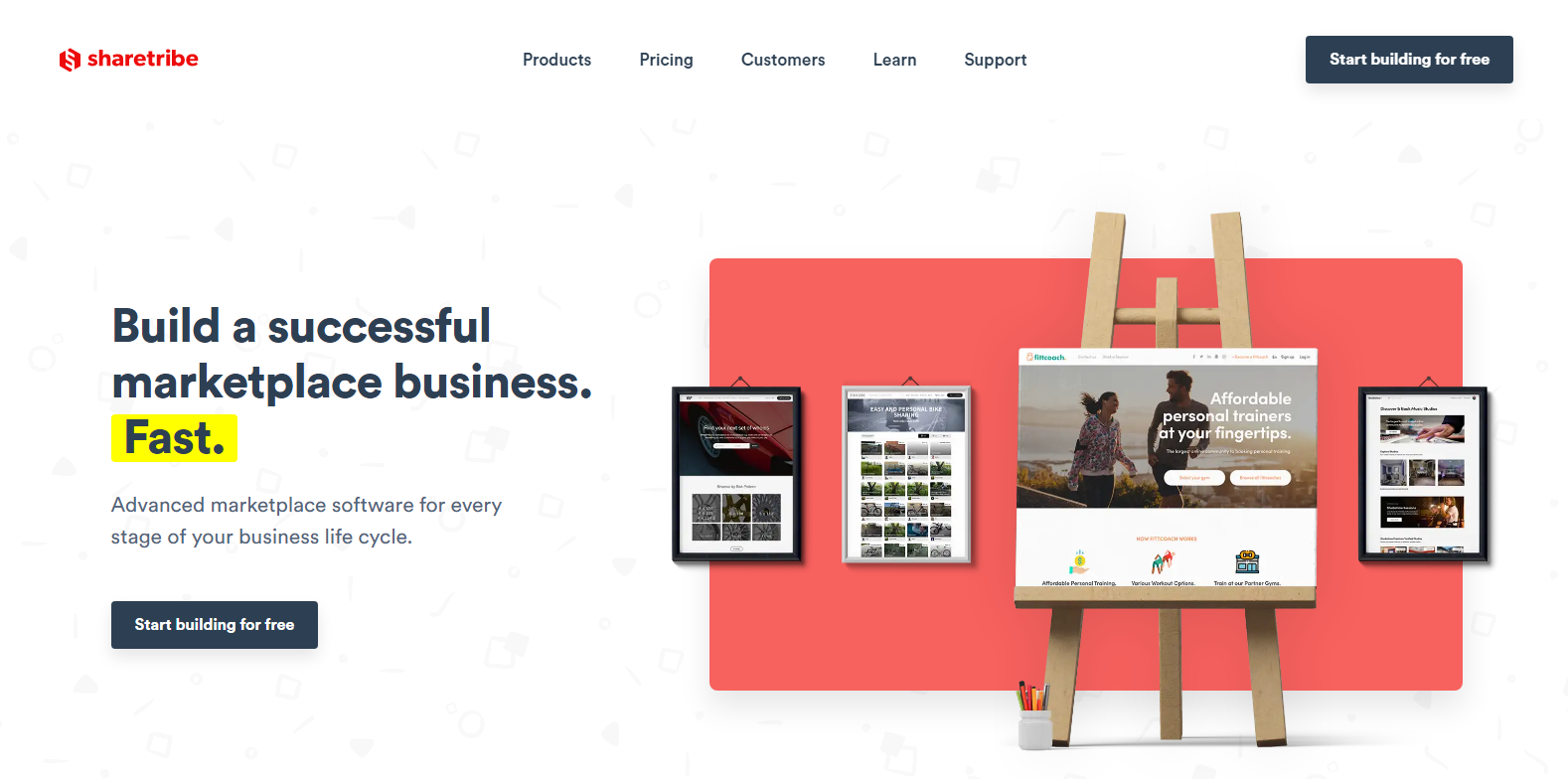
Sharetribe was founded in 2011. The codebase that powers Sharetribe Go today has gone through many transformations, but its origins are based on the open-source project only.
It is a peer-to-peer marketplace solution. It can be used for renting, selling, offering services or giving things away for free. Therefore, Sharetribe can help you launch customer-to-customer (C2C), vendors-to-vendors (B2B) or vendors-to-users (B2C) businesses.
You can easily start your marketplace with Sharetribe go and then move to Sharetribe Flex for more functionality and features.
SharetribeGo offers the following features:
- Multiple Order Flows
- Advanced Filtering & Categorization
- White Label Design
- Advanced Availability Management
- Powerful Admin Console
- Flexible Transaction Engine
- Customizable data storage and search engine
Limitations of Sharetribe:
- Issues in integrate third-party plugins with GO version
- Expensive FLEX version may not be suitable for startups
Sharetribe Pricing
The basic package of Sharetribe starts from $79 per month limited to 100 users. You will need to pay extra $99 for a custom landing page.
5. X-CART

X-cart was released in the year 2000 by Creative Technologies LLC — a Russian web development company. The same company later worked on Ecwid. At the time of launch, it was the world’s first PHP shopping cart software.
X-cart is an open-source PHP e-commerce software platform that enables online merchants to launch customizable eCommerce websites. It has Google Analytics and Yandex integration for tracking statistics. The app store also has Metrica, Diib analytics, Segment, CloudSearch, and other useful tools.
Following are the major highlights of X-cart:
- 45+ High-Converting eCommerce Templates
- Intuitive Drag and Drop Interface
- Real-Time Smart Search
- “Clunk-Free” WordPress Integration
- Handcuff Free Ecommerce Hosting
- Bulk Product Editing
- Search Product Details by UPC and Name
- Advanced in-app marketing
What are the Cons of X-Cart:
- Expensive Upgradation Fee
- Ticket-based Technical Support Costs Extra
X-Cart Pricing
The starter package of X-cart is offered at $29.95 per month that includes 1GB RAM, 1-core processor, 25GB disk space and shared SSL.
*Please note, this is just the hosting. To use X-Cart, you still need to purchase a license for the software.
X-cart offers various paid Licenses like Business License ($495 ), Multi-Vendor License ($1,495), etc, which provides a different range of features and services.
Which multi-vendor platform should you choose?
The more options, the more it gets confusing. Every eCommerce marketplace solution is unique in its own way. Which solution is the right choice for you will depend on your business requirements and the features offered by the software solution.
The best thing you can do is to visit the websites of the above-mentioned platforms and try out their demo. It will give you more clarity and help you pick the right option.
Start with Yo!Kart right here — Yo!Kart Demo

